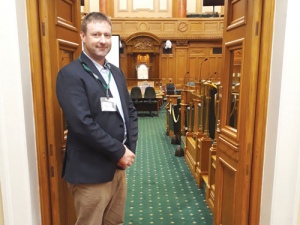“The urban centres, particularly Auckland, are becoming so powerful in their numbers in Parliament, just by sheer weight of population. It’s possible for our issues to be marginalised,” Patterson told Rural News.
“I’ll be making sure the voice of the south is heard alongside the other southern MPs, I’m sure.”
Representing New Zealand First, Patterson polled third in the Clutha-Southland electorate, with 3192 votes on the provisional election night results, behind National’s Hamish Walker on 19,524 and Labour’s Cherie Chapman on 6519.
However, NZ First garnered nine list MPs, and Patterson enters Parliament at seventh on the party list.
His entry into national politics follows his run with the now-defunct Meat Industry Excellence group which opposed the 50% sale of Silver Fern Farms to Shanghai Maling. Foreign ownership remains a big issue for him. “Particularly farmland: I am totally opposed to the sale of farmland to foreign interests,” he said.
Patterson says he was in the National Party until three-four years ago when he gave his weight to MIE in its efforts to reform the red meat sector.
“Part of that role was when we were coming up to Parliament and lobbying the Government, and I was very frustrated by their apathy and ambivalence,” he says. “About that time Winston won the Northland by-election and I felt we needed a bit of a political alternative.”
Patterson says his more direct involvement with NZ First came when the party opposed the Silver Fern sale.
“I was one of the farmers pushing back on that, and NZ First was doing so as well, so that’s where my contact with NZ First started and it went from there.”
Patterson says NZ First is “totally opposed” to a water tax and had campaigned on that.
“On the rural-urban divide the standard of debate has been frustratingly poor. There’s probably been a lack of understanding by urban dwellers about how much farmers are doing in lifting their environmental performance.
“Equally, some of the outcomes on the deterioration of some catchments need to be addressed.
“Ultimately, we all want the same thing. However, there seems to be bickering about who’s causing the problem rather than getting down to what the solutions are. That’s where we need to be.”
Raised on a fourth-generation family cropping farm at Lakeside, in Canterbury’s Ellesmere district, Patterson has been farming “on and off” since he was 17, minus overseas travel and off-farm work.
But he has always had a passion for stock farming and for the last 10 years has farmed a 503ha, 5000 stock unit property of medium-steep hill country near Lawrence.
Going to Wellington will be “quite a change,” Patterson admits. “I’ve got a young guy going to step into the role of manager. I hope to get back there from time to time and do the odd day when I can, but it’s going to be fairly limited.”

















